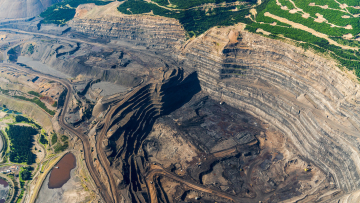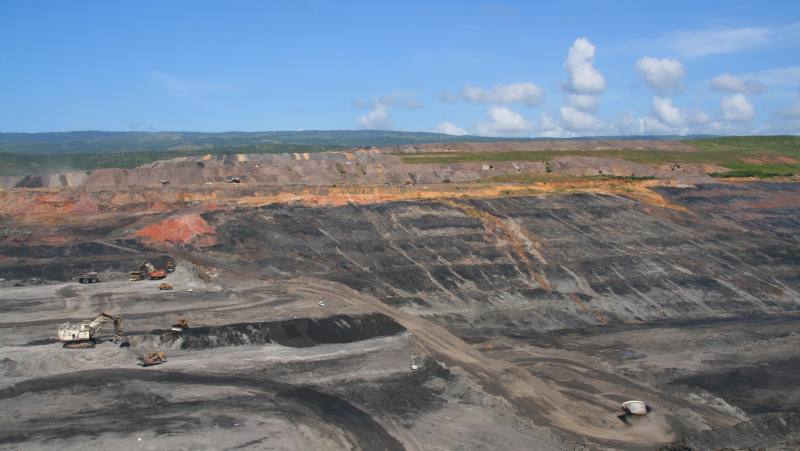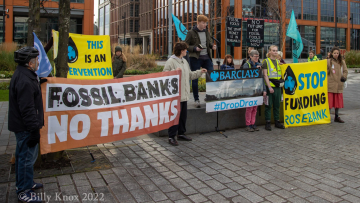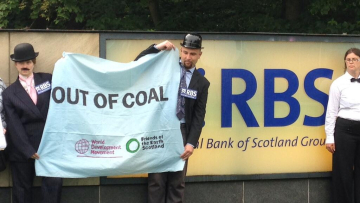
Project – On record
This profile is no longer actively maintained, with the information now possibly out of dateBankTrack
climate@banktrack.org

Project – On record
This profile is no longer actively maintained, with the information now possibly out of dateBankTrack
climate@banktrack.org
Why this profile?
The Cerrejón coal mine project has disregarded the human rights of local communities for decades. The operation exacerbates regional droughts and as of June 2021, its proven and probable coal reserves amounted to 334 million tonnes. The burning of these reserves is an unacceptable threat to global climate stability.
What must happen
| Sectors | Coal Mining |
| Location |
|
| Status |
Planning
Design
Agreement
Construction
Operation
Closure
Decommission
|
| Website | https://www.cerrejon.com/en |
The Cerrejón thermal coal mine in La Guajira is the largest in Latin America and one of the world’s biggest open-pit coal export mining operations. Approximately 80,000 tonnes of coal per day is transported 150km via rail to Puerta Bolívar. During 2020 and 2021, the vast majority of Colombia’s coal exports went to the Middle East. Coal crushing, washing, and storage all take place at the mine, as does quality control in an on-site laboratory. Cerrejón’s steady expansion has led to the destruction of entire Indigenous and Afro-Colombian villages, while the extracted coal – 559.8 million tonnes between 2002 and 2021 – has had a massive impact on the world’s climate. The mine has been wholly owned by the giant, UK-listed mining company Glencore since January 2022, when it purchased the other two thirds from its former partners BHP Billiton and Anglo American.
Impact on human rights and communities
The mistreatment of local communities is a longstanding issue of Cerrejón’s mining operations. Cerrejón’s promotional materials give the impression that the company is helping the communities it has displaced, but in reality, underhand tactics were used to buy off individuals and sow internal divisions. In Roche, Cerrejón paid inhabitants extra to leave the village early, but those who stayed faced power cuts and water shortages for weeks at a time. FECODEMIGUA (the Federation of Communities Displaced by Mining in La Guajira) was formed to defend community interests and demand compensation.
In 2000, Old Oreganal was forced to move to a Cerrejón-built, semi-urban village that could not support the displaced community’s traditionally agricultural livelihood. Villagers from the village of Tabaco were evicted in 2001 for a Cerrejón expansion but, 15 years later, they were yet to be resettled. Roche, Chancleta, Tamaquitos, Manantial, Palmarito, El Descanso, Caracoli, Zarahita, and Patilla are just some of the other communities that have been devastated or simply erased by the Cerrejón coal mine.
Basic rights are casually threatened by Cerrejón, such as access to water: In 2011, the companies then operating the mine approved expansion plans that require rerouting 26 kilometres of La Guajira province’s main river, the Ranchería. This "P500 project" was vehemently opposed by locals for whom the river is their main water source and in November 2012, the project was suspended. Expansion is not off the table, although by 2021 Glencore had established a "Paris-aligned coal depletion strategy".
Threats to Indigenous territories are entwined into the project, which spans 69,000 hectares of Wayúu territory. The Wayúu share this land with people of African descent, farmers, and other Indigenous groups. Threats include cultural weakening, malnutrition and dehydration via contaminated water, and respiratory conditions partially attributed to breathing air contaminated with coal dust. Furthermore, Wayúu children are already suffering from stunted growth and a range of diseases, including chronic diarrhoea, respiratory and skin problems, vision loss, and more. From 2014-2016, these children accounted for more than 90% of childhood mortality in La Guajira, despite the Wayúu representing just 38% of La Guajira’s population.
Poor working conditions at the Cerrejón mine have frequently been highlighted, such as exploitation through cheaper labour, unhealthy working conditions, and 12-hour shifts. The Colombian coal workers' union Sintracarbón actively represents Cerrejón miners, but pro-union workers have been reportedly intimidated or replaced with cheaper, casual workers. In 2008, Sintracarbón union leader Adolfo González Montes was tortured and murdered at home in front of his children. Deteriorating working conditions prompted Sintracarbón to organise a strike in February 2013, as well as a longer, 91-day strike in 2020.
The exacerbation of COVID-19’s regional impact hit the Wayúu people particularly hard, prompting representatives to appeal against Cerrejón and its activities to the United Nations. Pervasive drought and respiratory problems in the area can be directly attributed to mining activities, both of which make combatting COVID-19 much more difficult for the Wayúu.
Impact on climate
Significant contributions to climate change are being made by the Cerrejón coal mine. If the entirety of Cerrejón’s known coal reserves are burned, the resulting 13 billion tonnes of CO2 emissions would be equivalent to 184 years of Colombia’s national emissions. Global heating is already affecting Colombia: In 2013, The Council on Hemispheric Affairs said the surface of the Andean glaciers has shrunk by more than 90% over 10,000 years, with most of this happening since the Industrial Revolution.
Between 2002 and 2021, 559.8 million tonnes of coal were exported from Cerrejón, mostly to European and North American countries. Colombia’s per-capita carbon footprint is less than a fifth of the UK's and 11 times less than the USA’s.
Impact on nature and environment
Droughts and water contamination can be attributed to the mine, which draws approximately 2,700,000 litres of water from the region every day. Alongside groundwater, large volumes of water are taken from the Ranchería River. These impacts cause broad environmental damage to local rivers and habitats.
From 2016-2021, 33 commercial banks financed Cerrejón coal mine's owner Glencore via loans and underwriting services totalling USD 16.027 billion. See below for more details on the banks involved.
Cerrejón coal mine is owned by the Anglo-Swiss multinational commodity trading and mining company, Glencore. The mine was an equally-owned joint venture between Glencore, Anglo American, and BHP Billiton, until Glencore bought out its partners in January 2022.
Applicable norms and standards
Forum Syd - the coal mine Cerrejón in Colombia
The coal mine Cerrejón in Colombia has caused environmental desctruction and violations of human rights for over 30 years.
Colombia – The curse of coal | DW Documentary
Documentary trailer: La Buena Vida
Train with coal from Cerrejon mine
Cerrejon - La Muerte Negra
2022
2022-02-28 00:00:00 | Cerrejón output jumps by 89% during 2021
Annual production at Colombia’s Cerrejón coal mine bounced back to 23.4 million tonnes in 2021, an 89% year-on-year rise following a 2020 productivity dip owing to COVID-19 restrictions and a 91-day strike, organised by Sintracarbón. Cerrejón’s 2019 production amounted to 25.8 million tonnes.
2022-01-11 00:00:00 | Glencore completes acquisition of Cerrejón coal mine
Despite stating in early 2021 that it was cutting ties with Cerrejón, Glencore has officially acquired both BHP’s and Anglo American’s interests in the coal mine. In June 2021, the UK-based company said “the progressive expiry of [Cerrejón’s] current mining concessions by 2034 is in line with our commitment to a responsible managed decline of our coal portfolio.”
2021
2021-02-25 00:00:00 | Shareholders Anglo American and BHP Group to exit Cerrejón
In order to make its operations more sustainable, Anglo American plans to exit thermal coal production by 2024. The company will exit the "Cerrejón thermal coal operation in Colombia in a responsible way and within three years”. Fellow shareholder Glencore has already announced its own exit this month, while BHP Group – Cerrejón’s third and final shareholder – intends to abandon its stake in the coming years.
2021-02-04 00:00:00 | Glencore subsidiary Prodeco returning Colombian mining contracts to state
Cerrejón coal mine shareholder Glencore has confirmed that its Colombian subsidiary Prodeco is exiting the country. As such, it will begin handing its mining contracts back to the Republic of Colombia via the National Mining Agency (ANM). Prodeco will remain in place until the formal contract relinquishment process is complete.
2021-01-20 00:00:00 | NGOs file complaint against Cerrejón coal mine before OECD
A coalition of NGOs has demanded the closure of the Cerrejón coal mine in a complaint presented to the Organisation for Economic Co-operation and Development (OECD). Led by the Global Legal Action Network (GLAN), the coalition cites “serious human rights abuses and devastating environmental pollution”, including the forced displacement of Indigenous and Afro-Colombian communities, and high local cancer and metal intoxication rates caused by environmental pollution.
2020
2020-12-01 00:00:00 | Colombia's longest-ever coal strike ends after three months
A coal miners’ strike at Cerrejón in Colombia ended today after the operator agreed to pay unionised workers a one-time bonus of COP 10.75 million (USD 3,000). The mine will also raise salaries in line with inflation (3.8% in 2020) between 2020 and 2023. The strike was called by Sintracarbón, Cerrejón’s largest union, in response to job losses, proposed changes in benefits, and a new work schedule called the ‘death shift’. Initial demands were a 6% salary increase and health, education, and housing benefits.
2015
2015-03-19 00:00:00 | Cerrejón targets efficiency savings as coal prices slumps
The CEO of Columbia’s Cerrejón coal mine has explained that efficiency savings are now at the heart of its business strategy after a drop in the price of coal.



